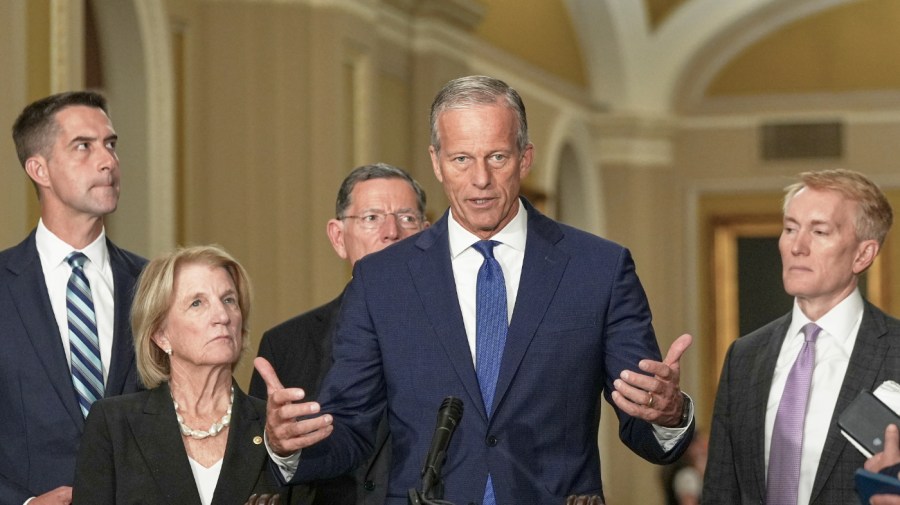Candidate recruitment failures may haunt Senate Republicans in 2026

Former Republican Senate Majority Leader Mitch McConnell (R-Ky.) analyzed the 2022 congressional election results in two words: “candidate quality.” It was a very insightful statement of the obvious that escapes far too many people in the political game.
Since 2010, Republicans have kicked away golden opportunities to win Senate races across the country, from Nevada to New Hampshire and from Delaware to Georgia. Republican primaries far too often produced inferior candidates.
Sometimes this is the fault of high-profile Republicans like President Trump making ill-advised endorsements of sub-par candidates. Sometimes it is the fault of Republican primary voters who make stupid choices voting for candidates who have no chance of winning in November.
And sometimes it is simply the refusal of good candidates who can win in November to get into a race and expose themselves and their families to public scrutiny and the sacrifice that running a statewide race entails.
That seems to be a developing narrative for Senate Republicans as we approach the 2026 midterm election. Over the last several weeks, Republicans have failed to recruit A-list candidates in both New Hampshire and Georgia.
Former New Hampshire Gov. Chris Sununu (R) announced that he will pass on the 2026 open seat race, just as he did in 2022 when he was governor. Apparently he has an aversion to Washington, unlike his father, a former White House chief of staff and his older brother, a former U.S. senator.
In Georgia, popular Gov. Brian Kemp (R) has opted out of the Senate race against incumbent Democrat John Ossoff.
As governor, Kemp has aggressively pushed conservative principles and it appears that he is interested in a national future. There will be no shortage of interested Republicans in the Senate seat but none wear the aura of likely winner that Kemp wielded.
Sen. Tim Scott (R-S.C.), chairman of the National Republican Senatorial Campaign Committee, must be beside himself, as he has been unable to add to the list of endangered Democratic held seats.
At the same time, Republicans’ hold on the North Carolina Senate seat is tenuous at best. Sen. Thom Tillis (R-N.C.) would have been in a 50-50 fight for reelection. His retirement confuses the party’s effort to hold the seat.
The president’s daughter-in-law, Lara Trump, has added her name to the list of potentially strong Republican candidates taking a pass in favor of time with her young family and her Fox News television gig.
That moves Republican National Committee Chairman Michael Whatley to the front of the line. Whatley has never held public office and may be vulnerable to the accusation of being excessively partisan. That is the job of a state party chairman and a Republican National Committee chairman, after all.
The North Carolina seat was always going to be tough for Republicans to hold. Now that Democrats have convinced former popular Gov. Roy Cooper (D) to enter the race this one should be marked as lean Democratic.
It is important to understand that while North Carolina leans conservative, it is not part of the Old South. The Research Triangle around Raleigh is a highly educated white-collar hub, and Charlotte has become a major finance center that houses the headquarters of Bank of America and Wells Fargo. Educated professionals define the demographic Republicans have shed in recent years.
And then there is Maine. The Republicans have one opportunity to hold the Maine seat. Her name is Sen. Susan Collins (R-Maine).
For all my MAGA friends there is a lesson to be learned here. The Maine Senate seat will either be filled by Collins or by a liberal Democrat. There is no alternative. There is no Republican bench in Maine.
In 2020, Donald Trump lost Maine by eight points. On the same night, Collins was reelected by 9 points. Enough said.
Thus far, the Democrats have failed to recruit a top notch challenger and are pinning their hopes on incumbent Gov. Janet Mills (D).
If the Democrats succeed in Maine where Republicans have failed in New Hampshire and Georgia, the only Republican held Senate seat in New England and the mid-Atlantic will be on very shaky ground.
In the Lone Star State, Texas Republicans have managed to shoot themselves in the most expensive cowboy boots imaginable. Incumbent Republican Sen. John Cornyn and Attorney General Ken Paxton (R) will each spend millions to destroy the other in their race for Senate. A Paxton primary victory will make the eventual Democratic nominee an even bet to become the first Democratic senator from Texas since Lloyd Bentsen retired in 1993.
Republicans can ill afford any surprise retirements. Iowa conservatives who are grumbling about incumbent Sen. Joni Ernst (R-Iowa) should stop before she walks away to the peace and quiet of the Iowa countryside.
Recent reports say the Trump White House is encouraging Ernst to run again. That’s the smart play. A multi-million-dollar battle in the middle of America for a Senate seat that should be a gimme for Republicans could be the tipping point that makes Sen. Chuck Schumer (D-N.Y.) Senate majority leader again.
And now you know how 53 Republican senators turns into 49.
Kevin Igoe is the former deputy chief of staff of the Republican National Committee and former executive director of Maryland Republican Party. He served as chief of staff of the Maryland Department of Budget and Management and was a Reagan White House appointee.